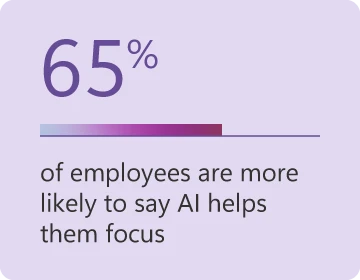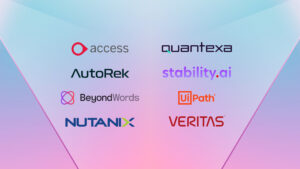
Agents of Change: unlocking the potential of AI-powered agents
Whatever your industry or role, you probably spend part of your day on repetitive or time-consuming tasks. For example, a police officer might regularly check updated protocols; an inventory manager will need to track stock updates from different sources; and a clinician must prepare patient notes and actions for daily multi-disciplinary team (MDT) meetings.
As organisations seek new ways to boost productivity and engage employees, AI-powered tools are stepping in to assist with these role-specific tasks. Microsoft’s new report, Agents of Change, explores how “agentic AI” tools are transforming organisations by handling routine processes, helping leaders solve real business challenges and freeing up time for higher-value work.
🎥 Watch: How AI is transforming work – key findings from the report
Hear Microsoft UK’s Rob Smithson (Business Applications Lead) and Eleri Gibbon (SME&C Lead) discuss insights from Agents of Change report and how businesses can get started with AI-powered agents.
Why AI agents herald a new work era
AI tools are already helping organisations work more efficiently. According to Microsoft’s report, a survey of nearly 3,000 UK decision-makers and employees found that 41% believe AI can independently deliver decision-ready insights.
But agentic AI isn’t just an efficiency tool. By freeing employees to focus on more strategic work and supporting innovation, it’s a major driver of economic growth.
Businesses that embrace it fully are seeing the biggest gains. For example, Taylor Wimpey, one of the UK’s largest housebuilders, has embedded AI-powered tools into its operations to improve decision-making and enhance customer interactions. By integrating AI into its home-buying process, the company is reducing administrative burdens, allowing sales teams to focus more on personalising the customer experience.
Read more about how Taylor Wimpey is using AI to enhance customer experiences.
The adoption divide: vision vs. reality
While AI’s potential is clear, our report notes that a gap remains between the optimism of leaders and employees’ preparedness to adopt AI. While half of senior decision-makers view AI as essential, only a third of employees feel their organisation is equipped to use these technologies effectively.
To bridge this gap, Arup, the global design and engineering firm, is using AI-powered agents to streamline complex design processes and improve collaboration across disciplines. By leveraging AI in its project workflows, Arup enables architects, engineers and urban planners to work more efficiently while maintaining high-quality, sustainable design standards.
Read more about how Arup is streamlining design processes with AI.
Building trust with secure, responsible AI
Successfully integrating AI requires strong security measures and a commitment to trust and ethics, which includes fostering transparency across the organisation.
🎥 Watch: Employee experience and security in AI adoption – key findings from the report
Hear Microsoft UK’s Mark Nixon (Modern Work Lead) and Marc Carney (Security Lead) explore how organisations can build trust in AI, from security best practices to responsible AI development.
According to our report, 46% of leaders say their organisation doesn’t have a formal AI strategy and only 40% feel confident they’re using AI effectively to protect against cyber threats.

As for ethics, Microsoft’s Responsible AI development approach focuses on transparency and accountability, which help organisations confidently implement AI.
Simmons & Simmons, a leading international law firm, is promoting responsible AI use by embedding AI-powered compliance tools into its processes. These tools help legal teams more efficiently detect regulatory risks while maintaining transparency and ethical oversight. By implementing AI with a strong governance framework, the firm is building confidence in AI-powered decision-making.
Read more about how Simmons & Simmons is advancing responsible AI use.
Shaping the future of work with AI-powered agents
Agentic AI is transforming work by automating everyday tasks, and employees who use AI appreciate the value it brings. The report found that these employees are 65% more likely to say it helps them focus on the most important parts of their job.

One reason for this morale boost is that, perhaps paradoxically, AI enhances teamwork. Notably, the best outcomes emerge when humans and AI work together rather than in isolation, whether for brainstorming, task co-ordination or creative development.
For example, marketing teams can use AI to generate web copy, ads or blogs – which humans then polish for publication. Similarly, radiologists can use AI to detect early signs of disease, while human experts verify the results, make treatment decisions and communicate with patients.
This brief review and Microsoft’s report provide insights into how AI-powered agents are reshaping work today. Watch the videos above for more inspiration on how to get started and make the most of agents. With the right strategy, you can quickly unlock new levels of productivity, security and innovation.
Now is the time to embrace agentic AI and realise the potential of your workforce.




